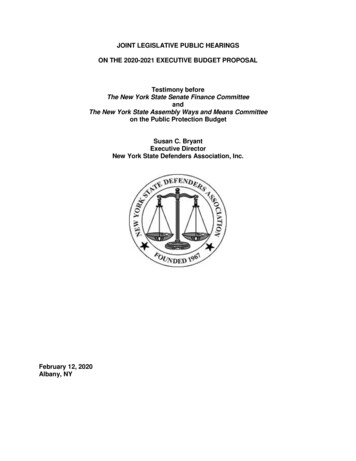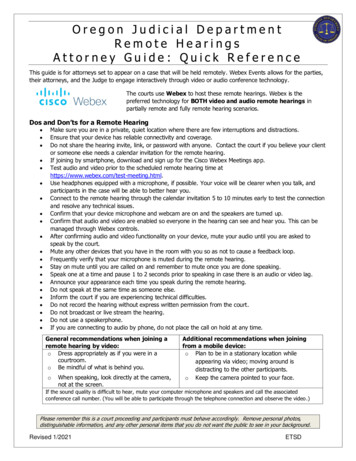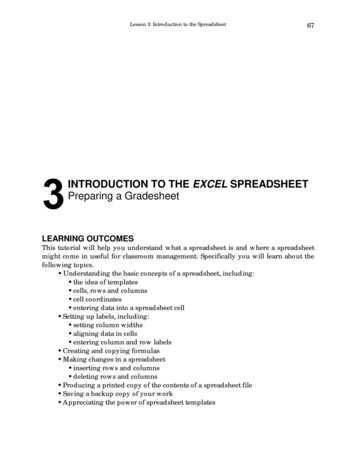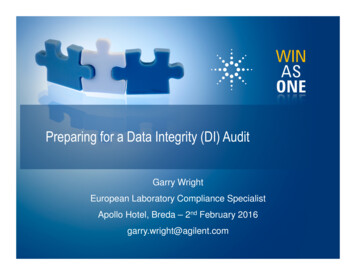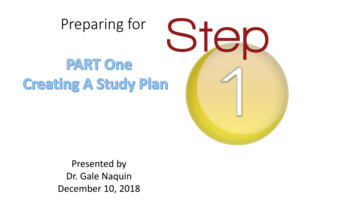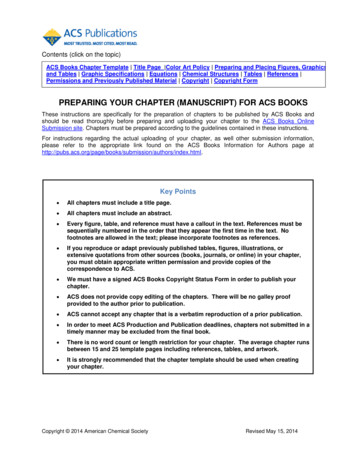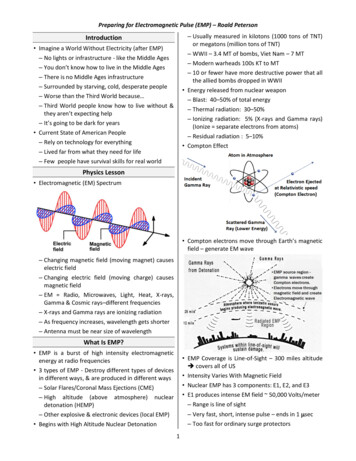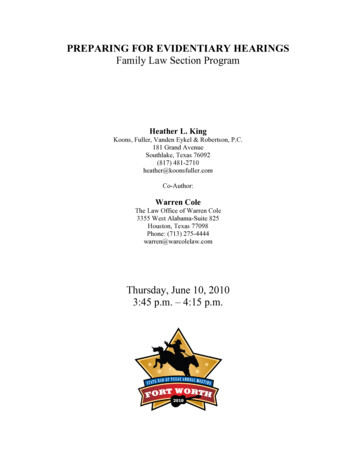
Transcription
PREPARING FOR EVIDENTIARY HEARINGSFamily Law Section ProgramHeather L. KingKoons, Fuller, Vanden Eykel & Robertson, P.C.181 Grand AvenueSouthlake, Texas 76092(817) 481-2710heather@koonsfuller.comCo-Author:Warren ColeThe Law Office of Warren Cole3355 West Alabama-Suite 825Houston, Texas 77098Phone: (713) 275-4444warren@warcolelaw.comThursday, June 10, 20103:45 p.m. – 4:15 p.m.!
Heather L. KingKoons, Fuller, Vanden Eykel & Robertson181 Grand Avenue, Suite 225Southlake, Texas 76092(817) 481-2710 / 481-2637 faxheather@koonsfuller.comHeather L. King is a Managing Partner at Koons, Fuller, Vanden Eykel & Robertson, with offices in Southlake,Denton, Plano and Dallas, Texas. Ms. King is AV rated in Martindale Hubble, is certified by the Texas Boardof Legal Specialization as a specialist in family law, and is a Fellow in the American Academy of MatrimonialLawyers. She is a past President of the Tarrant County Family Law Bar Association, immediate past Presidentof the Tarrant County Bar Association, and incoming President of the Texas Academy of Family LawSpecialists. She is a Council Member of the Family Law Counsel of the State Bar of Texas and has served onnumerous committees in that regard. She is recognized as a Texas Super Lawyer by Texas Monthly Magazine, aTop Attorney featured in Fort Worth, Texas Magazine, Top Fifty Female Attorneys in Texas, Texas MonthlyMagazine, Top Fifty Female Super Lawyers, Texas Monthly Magazine, Top 100 Lawyers in Dallas Fort Worth,Texas Monthly Magazine, Top Women Lawyers in Dallas by D Magazine, and is named as one of The BestLawyers In America. She has participated in numerous continuing legal education presentations, publicationsand articles, and is the co-author of Texas Family Law: Direct & Cross Examination, Suggested Questions,Ideas & Outlines (2000), Texas Family Law: Direct & Cross Examination, Suggested Questions, Ideas &Outlines, A focus on Children (2002), Texas Family Law: Direct & Cross Examination, Suggested Questions,Ideas & Outlines, A Focus on Property (2004). She is a co-annotator of the Lexis Texas Annotated FamilyCode, and most recently co-authored Protecting Your Assets From A Texas Divorce 2nd Ed. (PSG Books 2009).She has also had articles published in Texas Lawyer, Fort Worth Magazine and The College bulletin, News forMembers of the College of the State Bar of Texas.
EVIDENCE DEMONSTRATIONSHEATHER L. KING!Koons, Fuller, Vanden Eykel & Robertson, P.C"!181 Grand AvenueSouthlake, Texas 76092Phone: (817) 481-2710heather@koonsfuller.comWARREN COLEThe Law Office Of Warren Cole3355 West Alabama-Suite 825Houston, Texas 77098Phone: (713) 275-4444warren@warcolelaw.comState Bar of Texas2010 ANNUAL MEETINGJune 10-12, 2010Fort Worth
Evidence DemonstrationsTABLE OF CONTENTSI.SCOPE OF ARTICLE . 1II. THE BASICS . 1A. The Proponent - Common Oversights . 11. Failure to Mark Exhibits . 12. Failure to Refer to the Exhibit Number . 13. Failure to Offer the Evidence. . 14. Failure to Have the Necessary Predicate(s) Available and Ready . 15. Failure to Have Enough Copies . 16. Failure to Obtain a Stipulation on Ruling Prior to Starting Trial . 17. Failure to Make Offers of Proof . 1B. The Opponent - Common Oversights. 11. Premature Objections . 22. Permitting the Witness to Testify from the Exhibit Prior to its Admission . 23. Failure to Request the Witness on Voir Dire . 24. Failure to Timely and Properly Object . 2III. SELECTIVE EXAMPLES OF PROPER EXAMINATION . 2A. Impeachment With A Prior Inconsistent Statement . 21. The Law . 22. Prior Consistent Statements . 23. Tactical Considerations . 24.Steps For Impeaching With A Prior Inconsistent Statement. 3a.C Confirm the Testimony Being Impeached . 3b. C Credit the Prior Inconsistent Statement . 3c.C Confront the Witness with the Impeaching Statement. 4d. C Contrast. . 5B. Refreshing Recollection. . 51. The Law . 52. Steps For Refreshing Recollection. . 5C. Past Recollection Recorded . 51. The Law . 52. Steps For Introducing A Past Recollection Recorded . 6D. Photographs, Videos & Other Recordings . 61. Authentication . 62. Applicability of the Best Evidence Rule. . 63. The Proper Foundation . 6i
Evidence DemonstrationsEVIDENCE DEMONSTRATIONSexhibit by number. One cannot appreciate the severityof this mistake until they read the statement of facts inthe appeal and discover that the record is unclear as towhat exhibit was being referenced.I.SCOPE OF ARTICLEA trial attorney can never feel complacent aboutthe rules of evidence. Knowledge of the rules andproper application not only preserves appellate error,but greatly enhances the presentation of the client’scase. This paper and presentation is intended to providethe practitioner with some tips on effectivepresentation as it relates to certain rules of evidencewhich the authors believe to be, not misunderstood, butmisused. The rules covered are very limited in contentand the reader is directed to the other articles dealingwith evidence which are included in the course book.Every trial lawyer possesses his or her own style andthis paper is by no means an attempt to alter the wayone tries their case. This writing is an attempt toprovide the trial lawyer with some helpful guidelinesthat will hopefully embellish one’s individual style.3.Failure to Offer the Evidence.All trial attorneys have at one time or anotherbeen guilty of this faux pas. It occurs after counsel hasdone a masterful job in laying the predicate andidentifying the document. After all the hard work isdone then he or she lays the item on the bench never tofind its way into the appellate record. This is yetanother reason to have an exhibit list with an “offeredand admitted” box to check.4. Failure to Have the Necessary Predicate(s)Available and Ready.Should a particular piece of evidence have apredicate that counsel does not have committed tomemory, he or she should always have it written out orthe necessary authority handy to present to the court.II. THE BASICSRegardless of one’s knowledge of the law and therules of evidence, many lawyers continue to overlookthe most basic fundamentals in the presentation of theircase. At the risk of being overly simplistic, thefollowing are but a few of the mistakes that the authorscontinue to observe in the courtroom. Failure to adhereto some of these basics will result in a sloppypresentation, an angry fact finder and court reporter,and the possible exclusion of crucial evidence.5.Failure to Have Enough Copies.Very few moments in a trial are more frustratingthan proponent’s counsel, opposing counsel, the judge,parties, and court reporter all trying to look at the onlycopy of the exhibit. Always have a copy of the exhibitavailable for all involved.6.Failure to Obtain a Stipulation on Ruling Prior toStarting Trial.If at all possible counsel should attempt to securea stipulation from opposing counsel or obtain a pretrialruling from the judge prior to the heat of battle. Theproponent’s case flows smoothly and the patience ofall involved is extended greatly.A. The Proponent - Common Oversights.The party offering evidence has the burden to laythe proper predicate. This is usually accomplishedthrough the testimony of a witness. The profferedevidence must be both relevant and probative. In mostcases, these two elements are inferred from the natureof the offer itself. Assuming this hurdle is cleared theevidence must be offered and a ruling obtained on itsadmissibility or exclusion. TEX. R. CIV. EVID. 103(B).However, before one gets to this phase, they shouldmake every effort to avoid some of the followingpitfalls.7.Failure to Make Offers of Proof.If a crucial piece of evidence has been excludedby the Judge, the proponent’s job is not over. An offerof the excluded evidence must be made to preserveerror. Tex. R. Civ. Evid. 103(a)(2). The offer can bemade at the time the ruling is obtained or at anytimeprior to time the jury is charged or the trial courtrenders. Offer of proof may be in the form of a concisestatement so long as it adequately apprizes the court ofthe substance of the testimony and adequatelypreserves complaint. # %&'(!)"!# %&'( , 911 S.W.2d40, 51 (Tex.App.–Beaumont 1995, writ denied.)1.Failure to Mark Exhibits.To alleviate this potential mistake, always premark the exhibits prior to trial. Prepare an exhibit list.Pre-marking exhibits with an accompanying list willplace the Advocate in esteem with the court reporterand trial judge, and provide the attorney with arelatively clear road map of where they are going.B.The Opponent - Common Oversights.Just as the law of physics demonstrates that forevery action there is an equal reaction, counsel for theparty opposing the admission of evidence can be guiltyof similar human error.2.Failure to Refer to the Exhibit Number.When Questioning Witness More than often theattorney generically refers to the “exhibit” whenquestioning the witness as opposed to the specific1
Evidence Demonstrationsalso occur when the witness has given a writtenstatement or made oral statements that differ from thetrial testimony, but these are much less common thanimpeachment with a deposition.1.Premature Objections.It is both disruptive and annoying to the factfinder to listen to a multitude of objections during thecourse of questioning by the opposing side. Unless thepreliminary questioning is really harmful to the case,wait until the offer is actually made prior to stating theobjection.1.The Law.The witness must be told the contents of thestatement, time, place and person to whom statementwas made, and must be afforded the opportunity toexplain or deny the statement. *% ,(-!)"!./'0-!1234(,5!6&'., 853 S.W.2d 623, 637 (Tex.App.–Houston [1stDist.] 1993, writ denied); TEX. R. CIV. EVID. 612.Before impeaching a witness with a prior inconsistentstatement, the witness must be "told the contents ofsuch statement and the time and place and the personto whom it was made, and must be afforded anopportunity to explain or deny such statement.".TEX.CIV. R. EVID. 613(a); 7,2((&!)"!12%2( , 61 S.W.3d90, 91 (Tex. App. - Waco 2001, no pet.). Not to beconfused with Recorded Recollection [TEX. R. CIV.EVID. 803 (5)]. The witness does not have totalmemory failure as to the event, but relies on a writingto refresh his recollection of the event. If the witnessuses the writing to refresh his memory, the opposingparty is entitled to use it to cross examine andintroduce the portions relating to the witness'stestimony. The court reserves the right to conduct an incamera inspection of the writing and excise anyirrelevant portions.2.Permitting the Witness to Testify from theExhibit Prior to its Admission.Until the subject exhibit is admitted into evidenceby the court, it is not evidence. One should neverpermit the tendering witness to testify from the exhibituntil it has been admitted. The witness’ primaryfunction prior to admission is to identify the exhibitprior to offer.3.Failure to Request the Witness on Voir Dire.If it becomes apparent from the preliminaryquestioning that the witness does not have adequatepersonal knowledge to qualify the exhibit, counselshould request to take the witness on Voir Dire. Askconcise questions, relevant only to the issues relating tothe exhibit. This is not cross-examination.4.Failure to Timely and Properly Object.Depending on the subject of the offer, theopponent of the evidence must be prepared to timelyand properly object or error will be waived. Theobjection must be material and specific or waiver willoccur. If objecting as to relevancy, state in theobjection as to why the offer is irrelevant.Practice Note: Use of an otherwise privileged writingto refresh a party's memory will constitute a waiver ofthat privilege. #82-!39!:(& &8,3&!)"!;48, % , 716 S.W.2d 121, 123 (Tex. App. - Dallas 1986, origproceeding).III. SELECTIVE EXAMPLES OF PROPEREXAMINATIONA. Impeachment With A Prior InconsistentStatement.The impeachment of a witness with a priorinconsistent statement can be one of the most dramaticmoments of a trial. If done well, it can leave awitness’s credibility in tatters with no one in thecourtroom believing a thing the witness has to say. Buta poorly executed attempt at impeachment can have theeffect of actually bolstering a witness’s credibility andturning the judge and jury against the cross examininglawyer. The following is a discussion of how toeffectively impeach a witness with a prior inconsistentstatement.In civil litigation, impeachment with a priorinconsistent statement usually arises because thewitness’s testimony at trial differs in some respectfrom the witness’s deposition testimony. Depositionsare such a ubiquitous part of family law practice that itis quite common for discrepancies to occur betweenthe witness’s testimony at trial and in a deposition.Impeachment with a prior inconsistent statement can2.Prior Consistent Statements.Recent fabrication of events or a statement arecommonplace in family law cases. A counterpart toimpeachment by use of a prior inconsistent statement isthe use of a prior consistent statement of a witness tocure any such accusations. When applicable, thequestioner is permitted to show that the witness did, infact, previously testified the same as in trial. See, 8,,3/48! %'898'!*"!#3"!)"! ?%' , 687 S.W.2d 414(Tex. App. – Houston 14th Dist. 1985).3.Tactical Considerations.Impeach only on important matters. Witnesseshave fallible memories just as do judge and jurors. Asa result, judges and jurors tend to be forgiving of minorerrors in a witness’s testimony. Impeaching a witnesswith a prior inconsistent statement over trivial matterwith no importance to the case is likely to engender aresponse from the judge and jury of “So what?” orquestions about why the examining lawyer is pickingon the witness. Impeachment should be saved for2
Evidence Demonstrationsimportant matters where the judge and jury can easilysee that this is a matter where an honest witness wouldnot make a mistake.The prior statement must actually be inconsistentwith the witness’s trial testimony. Merely because awitness testifies using different language than in theprior statement is not enough; the previous statementand the present testimony must be inconsistent. Forexample, there is no inconsistency if the witnesstestifies in the deposition that “the car was going fast,”but at trial states the car was going 30 miles over thespeed limit.” A useful rule of thumb is to ask whetherthe witness could testify truthfully to what is in theprior statement and what is being said at trial.Impeachment is appropriate if only one of the versionscan be correct.Sometimes the prior inconsistent statement isfavorable to the impeaching side although most often itis unfavorable. In those situations where the priorstatement is favorable, the goal usually is not todiscredit the witness, but to have the fact finder acceptthe prior statement as true.The method ofimpeachment is conducted differently when the goal isto discredit the witness. The examining lawyer mustdecide on the objective--discredit the witness or ment.Where a friendly witness has made a mistake, it isusually more effective to attempt to refresh thewitness’s memory than to impeach the witness. Ifnecessary to impeach, it is usually done with afriendlier and gentle tone of voice. Similarly, a morefriendly and gentle tone of voice is usually used, evenwith hostile witnesses, when the goal is to have the factfinder accept the prior inconsistent statement as true.Q. Did you just testify the light was red for thewestbound traffic?4.b.If this method is used, it is important that thequestion be asked with a skeptical or incredulous toneof voice. If the question is asked in the same tone ofvoice as used in other parts of the examination, there isa risk that the judge and jury will believe that theexaminer is merely confirming the previous testimonybecause it is true. Therefore, it is necessary to ask thequestion with pronounced skepticism and with anincredulous tone. The skeptical or incredulous tone ofvoice, because it is out of the ordinary, will also alertthe judge or jury that something important is about tooccur.The second approach is to confirm the priorinconsistent statement by using the exact language ofthe prior statement. For example, if the witness h
Koons, Fuller, Vanden Eykel & Robertson, P.C"! 181 Grand Avenue Southlake, Texas 76092 Phone: (817) 481-2710 heather@koonsfuller.com WARREN COLE The Law Office Of Warren Cole 3355 West Alabama-Suite 825 Houston, Texas 77098 Phone: (713) 275-4444 warren@warcolelaw.com State Bar
